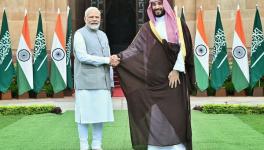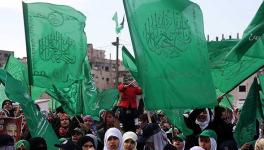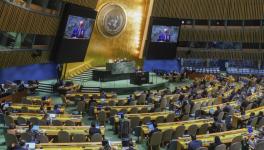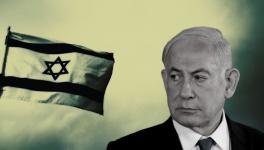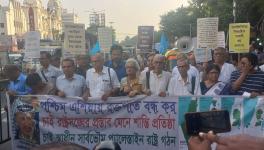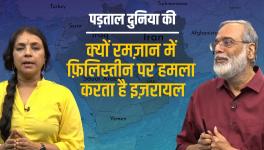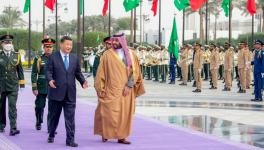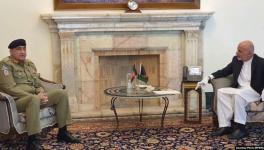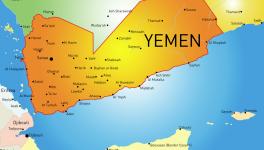ISIS Born from Occupation of Iraq, not Syrian Civil War
In the following video, Vijay Prashad, Edward Said Chair at the American University of Beirut, analyses the reasons behind the rise of ISIS. He says that although it's not clear where the Saudis stand in relation to ISIS, the group itself is a product of the Iraq War, and Western diplomats were in deep denial about its power prior to its major military offensive that began last week.
Courtesy: The Real News
Transcript:
ANTON WORONCZUK, TRNN PRODUCER: Welcome to The Real News Network. I'm Anton Woronczuk in Baltimore.
Secretary of State John Kerry says the United States is willing to cooperate with Iran over military action in Iraq in order to stabilize the power of the central government. Here's what he had to say.
JOHN KERRY, U.S. SECRETARY OF STATE: [W]e're open to discussions if there's something constructive that can be contributed by Iran if Iran is prepared to do something that is going to respect the integrity and sovereignty of Iraq and the ability of the government to reform--.
WORONCZUK: Meanwhile, reports of mass executions by ISIS have swept the mainstream news, and the Twitter account of ISIS reportedly said over 1,700 were executed as revenge for an ISIS commander who was killed before the major offensive that began last week. The city of Tal Afar west of the city of Mosul was also taken over by ISIS.
A U.S. aircraft carrier and two guided-missile ships have arrived in the Persian Gulf on Sunday, and Iran has reportedly sent 2,000 troops, and U.S. President Obama is still considering launching drone strikes or airstrikes. Former U.K. prime minister Tony Blair has weighed in on the ongoing events, saying, quote, "We have to put aside the differences of the past and act now to save the future." "Where the extremists are fighting, they have to be countered hard, with force."
Now joining us to discuss this is Vijay Prashad. Vijay holds the Edward Said Chair at the American University of Beirut. He's the author of 16 books, among them The Poorer Nations: A Possible History of the Global South and Arab Spring, Libyan Winter.
Thanks for joining us, Vijay.
VIJAY PRASHAD, EDWARD SAID CHAIR, AMERICAN UNIVERSITY OF BEIRUT: Thank you for having me.
WORONCZUK: So, Vijay, what's the significance of the city of Tal Afar being taken over by ISIS?
PRASHAD: Well, ISIS has had a major breakthrough this week. It took, of course, Mosul, came down south of the Tigris, took Tikrit, which is the hometown of Saddam Hussein and therefore very significant to the three organizations that are working together--ISIS, the Military Council, which is made up of former Iraqi army people, and then the Naqshbandi movement, which is led by a former deputy of Saddam Hussein, Izzat al-Douri. So these three organizations--the Baathists, Iraqi military forces, and ISIS--have taken a vast amount of Iraq in a very short time. But mainly it had been in the north-south axis from Mosul down to near Samarra.
Now they have moved westward. They've taken Tal Afar. They've already taken small roads that go toward Syria. But the Tal Afar capture has opened a corridor for them that will take them to the major eastern city in Syria of Deir ez-Zor, and from there, of course, right to Raqqah, which is the first major city in Syria that the ISIS organization had taken. So now we have from the borders of Aleppo--major city in Syria--all the way out to Mosul, we have a banner area, a kind of--we have, like, a belt controlled by the group ISIS, helped along in Iraq by former Baathists and former Iraqi military personnel.
WORONCZUK: And do you think that the role of the U.S. and Gulf states like Qatar and Saudi Arabia, in terms of arming and providing funding to various rebel groups within Syria, do you think that that has played a role in supplying ISIS with either manpower or military resources?
PRASHAD: Well, it's very hard to know what Saudi Arabia is doing. You know, they're not a very open society in terms of finding out the intricate ways in which the Saudi regime, that is, the kingdom, deals with jihadi groups. But it has been widely reported that Saudi princes, who are worth millions, hundreds of millions of dollars, have privately financed ISIS and groups such as ISIS, like Jabhat al-Nusra in Syria. So we know that private Saudi money has gone to the jihadi groups that are now in this vast belt that's stretched toward Iraq and Syria.
The United States has not been, also, clear and open about who it's supporting. We know that in eastern Jordan there's a U.S. camp where various Syrians are being trained. The Americans have not really said anything about it. It's likely that these are Free Syrian army personnel. On the other hand, we know that John McCain was at the Azaz border crossing about a year and a half ago meeting with people who were in /əˌrɑːrəˈʃamz/, which is also an al-Qaeda group.
So it's very unclear who's funding what.
What is certainly clear is the group ISIS, the Islamic State of Iraq and Greater Syria, was a product of the Iraq War. It is not really a product of the conflict in Syria. It has been enhanced by the conflict in Syria, but not created by it. In 2003, when the United States went and bombed Iraq in the "shock and awe" campaign, it opened the door for various al-Qaeda people to come in and join the insurgency, including Mr. al-Zarqawi, who came from Jordan, formed al-Qaeda of Iraq, created mayhem, introduced a very virulent form of sectarianism, and of course beheadings and suchlike. And it's out of al-Qaeda of Iraq that the Islamic State of Iraq was born. When the conflict opened up in Syria, they expanded their name to the Islamic State of Iraq and Greater Syria. So this organization is a product of the Iraq War.
Its finances has come, tangentially, perhaps, from the Saudis and the Americans, largely from sale of oil from oil fields in eastern Syria, from the theft of antiquities in Syria, and now, of course, one and a half billion dollars from the capture of Mosul. Their coffers apparently were only $500 million before they took Mosul, and now it is said that they control about $2 billion in cash and gold.
WORONCZUK: So, since these offense actions have taken place in the past few days, the mainstream press has been reporting endlessly on, you know, what is known about ISIS in terms of its numbers, its financial assets, its military prowess. And it seems that it would be pretty evident to anyone that ISIS is quite a fighting force to be contented with. Why do you think that the Obama administration, you know, probably with knowledge of this, why they waited so long, you know, why'd they wait until down to begin military action or to begin considering military action to defend the central government in Baghdad?
PRASHAD: Well, look, it's very hard to know what the Obama administration or indeed any U.S. administration thinks. You know, if you read the WikiLeaks cables, you know that there's one thing they say to the public and there's another thing that they say amongst each other. So we don't really know what the Obama administration's discussions have been like.
It is certainly the case that Western diplomats, what they have told journalists in the region, people in the region: these Western diplomats have been in deep denial. I mean, I had a conversation with a couple of European diplomats who told me about six months ago, when I was writing about ISIS, they said categorically that this is a great exaggeration, that ISIS in fact is a marginal force in Syria, it's not an important force in Iraq, that people like myself, you know, journalists who were trying to cover this story, were utterly deluded and exaggerating what was going on.
Of course, their delusion is also to be put on the table. After all, even though the Syrian revolution has deeply morphed from a populist Syrian uprising into a civil war that includes several branches of al-Qaeda, not just one--you know, Jabhat al-Nusra, Ahrar ash-Sham, ISIS, etc., and they're fighting against each other--this has become a toxic, dangerous situation, and I believe the West has been utterly confounded by what they have produced in large measure here. They don't have any easy answers.
You know, this thought that Mr. Kerry has been talking about of aerial strikes is delusion. I mean, you know, the Iraq War began with shock and awe. It was unable to pacify and make Iraq submit to Western authority. It's very unlikely that a massive aerial bombing campaign against ISIS will do anything more than put off the situation that ISIS thinks is inevitable, which is taking all of Iraq, or at least a substantial part of northern Iraq.
Other means have to be found. People inside Iraq need to feel empowered to fight against ISIS. And, you know, an aerial bombing campaign is not going to help them.
WORONCZUK: And what is the Kurdish government in the northern part of Iraq, what is their position towards ISIS? I mean, there have been some reports of some skirmishes and some fighting, but it doesn't seem as if ISIS is launching a full-out offensive in that region.
PRASHAD: You know, it's interesting. If you turn now to Syria, where in northeastern Syria there is a kind of Kurdish government established, and they have a major armed force called the People's Protection Units or the YBG, the YPG is just about above the road of Deir ez-Zor, which is, you know, basically in the hands of ISIS. And the YPG and ISIS have over the course of the last several months been in conflict. You know, they've been playing a kind of cat and mouse game, fighting over some border towns, etc., but no major engagements. Now with ISIS making statements that it wants to go north to Kirkuk--and this is particularly important because one of the three groups that are in alliance in this upsurge, the Naqshbandi movement, has some support in Kirkuk. This is the group led by the former Saddam deputy Izzat al-Douri. They've made some claims they want to go up to Kirkuk. So that Kurdish military in northern Iraq, the Peshmerga, has opened talks with the YPG. They want to coordinate activities. This is important. It's going to give, you know, some kind of local on-the-ground military strength to stop the advance of ISIS.
At the same time, by the way, from the south, the various Shia militias are being informed again. You know, Muqtada al-Sadr had earlier this year left Iraq and gone to Iran. He now has returned to Iraq. He has called for the reformation of what will be, again, a kind of Mahdi Army. They are on Saturday going to have a very large demonstration of military force against the ISIS advance and the Naqshbandi Army advance. The danger in all these on-the-ground defenses, on the one side of the Kurds, on the other of the Shia, is it's making this a deeply sectarian war, when much evidence suggests the general public in Iraq is not a sectarian public, is not interested in going down the road of a full-scale sectarian war. But I think the emergence of ISIS, now the idea that the Mahdi Army is going to come into the picture, is going to harden lines on sectarian grounds. And that's very bad for Iraq, indeed very bad for Syria.
WORONCZUK: Okay. Vijay Prashad, thank you so much for that report.
PRASHAD: Thank you so much.
WORONCZUK: And thank you for joining us on The Real News Network.
Get the latest reports & analysis with people's perspective on Protests, movements & deep analytical videos, discussions of the current affairs in your Telegram app. Subscribe to NewsClick's Telegram channel & get Real-Time updates on stories, as they get published on our website.









